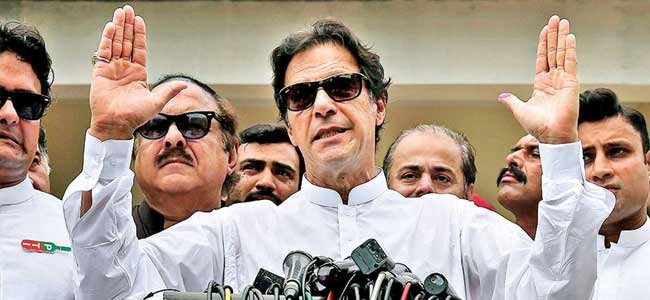
On August 16, Pakistan and China suffered a jolt in the UN Security Council when they raised the Kashmir issue in the aftermath of India’s decision to strip Jammu and Kashmir of its special status. The two were isolated as the rest of the Council including the other permanent members did not feel the need to intervene in India’s ‘internal affairs.’
Ten days later, Pakistan PM Imran Khan received another setback when US President Donald Trump credited his India counterpart Narendra Modi for keeping the Kashmir situation under control and also backtracked on mediating between the two, saying the issue can only be sorted out through bilateral talks.
China too asked both the neighbours to settle the above-mentioned issue peacefully and "discard the zero-sum game mentality”. To make matters worse for Imran diplomatically, Bahrain and the UAE awarded PM Modi their highest civilian awards. Both the countries had been approached by Pakistan for support over the Kashmir issue.
Senior foreign affairs journalist Ramananda Sengupta says the Kashmir move from the Modi government was a ‘masterstroke’ and Pakistan has been left gasping ever since.
“The abrogation of Article 370 has completely taken Pakistan by surprise and pushed them on the backfoot. The military there will now have to redefine its Kashmir doctrine. Also, except China and Turkey, they haven’t achieved much success in gaining allies in their diplomatic efforts against India,” he said.
“The motormouth politicians here (in India) need to control themselves before commenting on Kashmir as their remarks can be used by Pakistan in its diplomatic outreach against India,” he said, while highlighting Pakistan’s mischievous attempts to use news reports on the plight of Kashmiris to malign India in global forums.
Sengupta dismissed the nuclear threats from the Imran government as so much bluster. “Pakistan keeps issuing nuclear threats against India. That is nothing new. Things like the closure of trade routes and airspace will affect the Pakistan government more than their Indian counterpart. Besides, they face issues such as growing power tariffs and rising inflation, with a possible FATF blacklisting also moving closer. The whole Kashmir propaganda is an effort to divert the attention of common Pakistanis from these issues. We need to see how long Imran persists with his Kashmir adventure,” he said.
Talking about whether the two countries will come to the discussion table, Sengupta said, “The Modi government’s policy on bilateral talks with Pakistan has always been clear and consistent. Stop the terror completely and come to the discussion table. So, the chances of the two countries having bilateral talks look distant as of now. Even if talks happen, Pakistan will be under tremendous pressure as India will raise the issue of PoK.”
“The Modi government can also counter Pakistan’s diplomatic efforts by raising issues such as Balochistan and the growing number of attacks on religious minorities under Imran’s rule before the global media,” he added.
On Pakistan receiving a cold response to their diplomatic efforts in the Middle East, he said, “With the UAE and Bahrain felicitating PM Modi with their highest civilian awards, things have only become more difficult for Pakistan. From now on, they won’t be able to get resolutions on Kashmir passed at the OIC or any other Middle Eastern diplomatic forum with ease, since the region sees India as its new investment destination. Plus the Arab world will be looking for new allies like India and China amid a strained relationship with the West.”
When asked about US President Donald Trump’s flip-flops on Kashmir, Sengupta observed, “First of all, he (Trump) does not have any clear understanding on the whole issue. Secondly, the Pakistani and US militaries share close ties, with the former being a key importer of US-made defence hardware. So, the Pentagon would prefer giving Pakistan some support rather than allowing it to drift completely towards China.”
“On the other hand, China too will not be looking to interfere in the Kashmir row, as they are caught up with major issues right now such as the Hong Kong protests and a trade war with the US. India, which has already established itself as an independent power in a multi-polar world, would not be keen on China’s involvement in any diplomatic efforts to address the fallout of the Article 370 decision,” he concluded.
Pakistan continues to make contradictory statements on a possible ‘nuclear war’ with India, with Imran shutting down his Railway Minister by saying that his forces will ‘never, ever start a battle with India’.
With the recently-concluded South Asian Speakers’ Summit in the Maldives ignoring Islamabad’s assertions on Kashmir and Foreign Minister Jaishankar downplaying any possibility of talks with Pakistan, all eyes will be on the UN General Assembly where Imran is expected to harp on Kashmir once again on September 27.


.jpeg)

